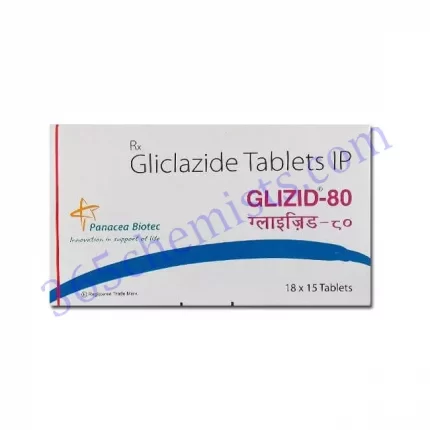Glypride 2mg Tablet (Glimepiride): A Comprehensive Overview for Effective Diabetes Management
One of the most common medications used for the management of diabetes mellitus type 2, the Glypride 2mg Tablet, has a very high success rate. The medication Glypride 2mg Tablet contains glimepiride as its active ingredient. Glimepiride is a member of the sulfonylurea class of medications, which are well-known for their ability to reduce blood sugar levels. This in-depth explanation of Glypride 2mg Tablet is meant to supply helpful information about the medication, including its applications, recommended dosage, potential adverse effects, and safety measures.
Understanding Glimepiride and Its Mechanism of Action
Glimepiride, the active ingredient in Glypride 2mg Tablet, plays a role in the treatment of diabetes by encouraging the pancreas to secrete more insulin. Insulin is a hormone that controls the amount of sugar that is present in the blood. Glimepiride helps persons with type 2 diabetes lower their high blood sugar levels by increasing the amount of insulin that their bodies secrete.
Uses of Glypride 2mg Tablet
The management of diabetes mellitus type 2 is the primary use for the Glypride 2mg Tablet. In addition to a healthy diet and regular exercise routine, doctors often recommend using this medication to help keep blood sugar levels under control. Individuals whose blood sugar cannot be maintained properly by lifestyle changes alone may benefit from taking the drug.
Dosage and Administration
It is possible for the recommended dosage of Glypride 2mg Tablet to change depending on the specific requirements of the individual and their reaction to therapy. It is essential to carry out the directions given to you by your healthcare practitioner or the dosage that is specified on the packaging of your prescription medication. In most cases, the initial dose that is recommended is 2 milligrammes, which should be consumed orally once per day, preferably with breakfast or the first substantial meal of the day. However, depending on the levels of sugar in your blood and the overall treatment plan that has been devised, your doctor may alter the dosage.
It is essential to take your Glypride 2mg Tablet at the same time each day in order to maintain regular control of your blood sugar levels. You should try to avoid skipping doses or making any modifications to the dosage that was prescribed without first consulting your healthcare provider.
Related Product
Glypride 1mg Tablet
Glypride 2mg Tablet
Precautions and Warnings
Before beginning therapy with Glypride 2mg Tablet, it is important that you discuss any preexisting medical problems, allergies, and drugs that you are already taking with your attending physician. Your healthcare professional will be able to evaluate the appropriateness and safety of this drug for you with the use of this information.
Keeping a close eye on your blood sugar levels while you’re taking Glypride 2mg Tablet is absolutely necessary. It’s possible that your doctor will suggest having your blood tested at regular intervals in order to confirm that the medicine is adequately managing your diabetes and isn’t creating any negative side effects.
It is crucial to note that the Glypride 2mg Tablet is not intended for use in people who have type 1 diabetes or diabetic ketoacidosis, which is a condition that is characterised by excessive levels of ketone in the blood and can possibly be fatal.
The Benefits of Glypride 2mg Tablet
The management of diabetes mellitus type 2 can be improved with the use of glypride 2 mg tablet, which has various advantages. These benefits include the following:
- Effective Blood Sugar Control: The Glypride 2mg Tablet, which contains the active substance glimepiride, assists in regulating the levels of blood sugar by stimulating the pancreas to release insulin. Because of this, glycemic management is improved, and as a result, the risk of problems connected with high blood sugar is decreased.
- Glypride 2mg Tablet Is normally Taken Once Daily, Making It Convenient To Incorporate Into Your Daily Routine Because Glypride 2mg Tablet is normally taken once daily, this makes it convenient for individuals to incorporate into their daily routine. Breakfast or the first substantial meal of the day is a good time to take the specified dose of medication, since this helps ensure that the prescription is taken as directed.
- Complementary to Changes in Lifestyle The Glypride 2mg Tablet is frequently given in conjunction with changes in lifestyle, such as adopting a nutritious diet and engaging in consistent physical activity. When combined with the aforementioned methods, it has the potential to significantly improve both the management of blood sugar and the overall control of diabetes.
- Adjustments to the Individualised Dosage Your healthcare practitioner will be able to modify the dosage of the Glypride 2mg Tablet based on your unique requirements and how well you respond to therapy. This individualised strategy enables optimal regulation of blood sugar while simultaneously reducing the likelihood of adverse consequences.
- Medication That Is Generally Well-Tolerated The Glypride 2mg Tablet is a medication that is generally well-tolerated by the majority of people. The most common adverse reactions are often moderate and transient, although significant adverse reactions are quite uncommon. You will be able to properly manage any potential adverse effects if your healthcare expert provides you with the appropriate monitoring and assistance.
Possible Side Effects
Glypride 2mg Tablet, like any other drug, has with it the potential to produce some adverse reactions in certain people. Some examples of common adverse effects include:
- Hypoglycemia is a condition that can be caused by the medication glimepiride, which lowers the amount of sugar in the blood too much. This can result in symptoms such as tremors, confusion, sweating, and dizziness. It is essential to be able to recognise the symptoms of low blood sugar and to promptly take the necessary steps, such as ingesting glucose-rich food or beverages, in order to return blood sugar levels to normal.
- Disturbances of the Gastrointestinal Tract It’s possible that some people will have problems with their gastrointestinal tract, including nausea, vomiting, diarrhoea, or stomach pain. These adverse effects are often modest and fleeting in nature.
- Allergic responses: Glimepiride has been known to cause allergic responses in extremely rare instances. These reactions can present themselves in a variety of ways, including rashes, itching, swelling, and even difficulties breathing. In the event that you encounter any of these symptoms, you should seek medical assistance right once.
- If you encounter any adverse effects, you should speak with your healthcare professional so that they can provide you with the proper guidance and assistance.
Conclusion
The Glypride 2mg Tablet, also known as Glimepiride, is an effective drug for the management of diabetes type 2. It does this by increasing the production of insulin, which in turn helps to reduce blood sugar levels and improves glycemic control. To achieve the best possible outcomes, it is critical to adhere strictly to the dosage instructions, maintain consistent monitoring of blood sugar levels, and maintain open communication with your healthcare professional. Glypride 2mg Tablet has the potential to make a substantial contribution to the effective management of diabetes mellitus type 2, provided that it is used correctly and that appropriate precautions are taken.












